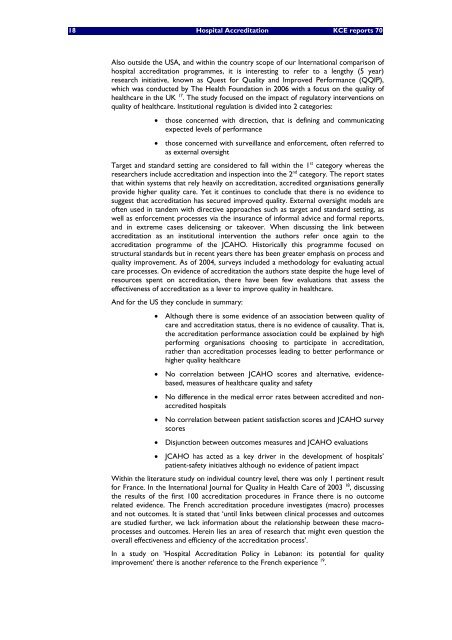Vergelijkende studie van ... - KCE
Vergelijkende studie van ... - KCE
Vergelijkende studie van ... - KCE
Create successful ePaper yourself
Turn your PDF publications into a flip-book with our unique Google optimized e-Paper software.
18 Hospital Accreditation <strong>KCE</strong> reports 70<br />
Also outside the USA, and within the country scope of our International comparison of<br />
hospital accreditation programmes, it is interesting to refer to a lengthy (5 year)<br />
research initiative, known as Quest for Quality and Improved Performance (QQIP),<br />
which was conducted by The Health Foundation in 2006 with a focus on the quality of<br />
healthcare in the UK 17 . The study focused on the impact of regulatory interventions on<br />
quality of healthcare. Institutional regulation is divided into 2 categories:<br />
• those concerned with direction, that is defining and communicating<br />
expected levels of performance<br />
• those concerned with surveillance and enforcement, often referred to<br />
as external oversight<br />
Target and standard setting are considered to fall within the 1 st category whereas the<br />
researchers include accreditation and inspection into the 2 nd category. The report states<br />
that within systems that rely heavily on accreditation, accredited organisations generally<br />
provide higher quality care. Yet it continues to conclude that there is no evidence to<br />
suggest that accreditation has secured improved quality. External oversight models are<br />
often used in tandem with directive approaches such as target and standard setting, as<br />
well as enforcement processes via the insurance of informal advice and formal reports,<br />
and in extreme cases delicensing or takeover. When discussing the link between<br />
accreditation as an institutional intervention the authors refer once again to the<br />
accreditation programme of the JCAHO. Historically this programme focused on<br />
structural standards but in recent years there has been greater emphasis on process and<br />
quality improvement. As of 2004, surveys included a methodology for evaluating actual<br />
care processes. On evidence of accreditation the authors state despite the huge level of<br />
resources spent on accreditation, there have been few evaluations that assess the<br />
effectiveness of accreditation as a lever to improve quality in healthcare.<br />
And for the US they conclude in summary:<br />
• Although there is some evidence of an association between quality of<br />
care and accreditation status, there is no evidence of causality. That is,<br />
the accreditation performance association could be explained by high<br />
performing organisations choosing to participate in accreditation,<br />
rather than accreditation processes leading to better performance or<br />
higher quality healthcare<br />
• No correlation between JCAHO scores and alternative, evidencebased,<br />
measures of healthcare quality and safety<br />
• No difference in the medical error rates between accredited and nonaccredited<br />
hospitals<br />
• No correlation between patient satisfaction scores and JCAHO survey<br />
scores<br />
• Disjunction between outcomes measures and JCAHO evaluations<br />
• JCAHO has acted as a key driver in the development of hospitals’<br />
patient-safety initiatives although no evidence of patient impact<br />
Within the literature study on individual country level, there was only 1 pertinent result<br />
for France. In the International Journal for Quality in Health Care of 2003 18 , discussing<br />
the results of the first 100 accreditation procedures in France there is no outcome<br />
related evidence. The French accreditation procedure investigates (macro) processes<br />
and not outcomes. It is stated that ‘until links between clinical processes and outcomes<br />
are <strong>studie</strong>d further, we lack information about the relationship between these macroprocesses<br />
and outcomes. Herein lies an area of research that might even question the<br />
overall effectiveness and efficiency of the accreditation process’.<br />
In a study on ‘Hospital Accreditation Policy in Lebanon: its potential for quality<br />
improvement’ there is another reference to the French experience 19 .

















